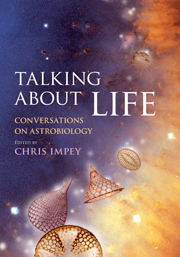Preface
Published online by Cambridge University Press: 07 September 2010
Summary
Scientists tell stories with the power to inspire. Geologists can tell a story of the titanic forces that have shaped the planet. Chemists can tell the stories of the almost infinite complexity that result from the combinations of fewer than a hundred ingredients. Physicists tell a story where the microworld of forces and interactions is based on a pleasing symmetry and unity. Biologists have their own story of unity, where the diversity of life is based on a single genetic code. The story astronomers tell is perhaps the grandest of all, since it plays out over 13.7 billion years in a universe that utterly dwarfs us.
One vital part of this story has yet to be told: the role of life in the universe. We have a high degree of confidence that the laws of physics and chemistry are universal. The visible universe contains about 1022 stars, a number so large that it's hard to grasp intuitively, and theory and observation indicate that many of them will have orbiting planets. Life on Earth is tenacious and pervasive; it's found in a bewildering array of environments, yet Earth is the only place we know of with life. That may be about to change.
Astrobiology is the scientific study of biology in its broadest context. It is a young field. Sixty years ago, we had little idea of how life on Earth started and no idea of the unity of life at a molecular level.
- Type
- Chapter
- Information
- Talking about LifeConversations on Astrobiology, pp. vii - xPublisher: Cambridge University PressPrint publication year: 2010



